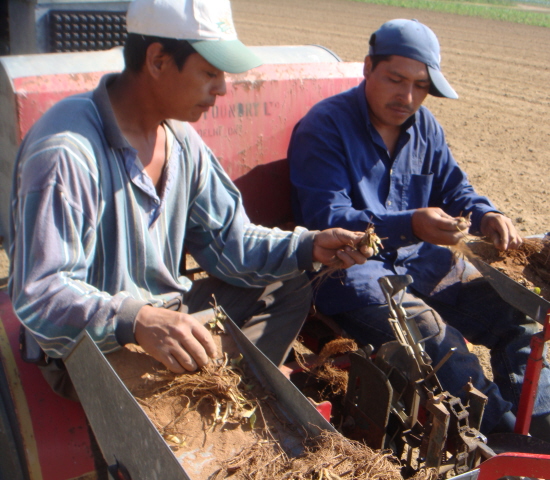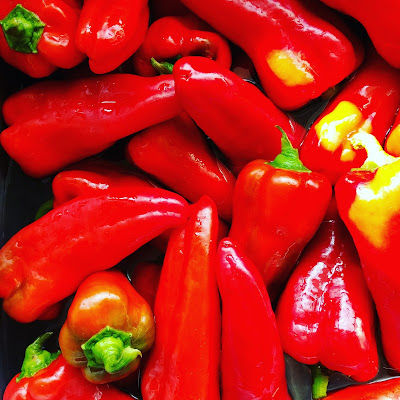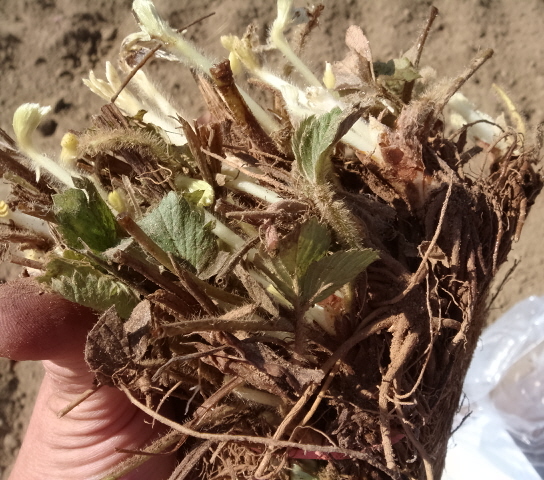On a hot summer day in 2011 on our farm, one of our Mexican men, named Domingo collapsed. When the paramedics arrived he was experiencing some major seizure activity. He was taken to a local hospital and later that day transported to a larger hospital in Burlington for care. He saw many different doctors, underwent many tests and once diagnosed (for an ailment he sadly brought with him from Mexico) was treated and I am happy to report he is now doing fine. It was a terribly scary ordeal. As Domingo's employer, I worked closely with the local Mexcian Alliance, The Mexican Consulate in Toronto to ensure Domingo was treated fairly and received after care and any medications he needed to make a full recovery. He spent 13 days in the hospital and I made sure RBC paid him a sum of around $1200 for missed wages and additionally covered the cost of his medications (considering he is required to contribute $3.36 per week into an insurance policy). Domingo has an Ontario health card and is fully covered by OHIP. Our relationship with Domingo is facilitated by F.A.R.M.S. (Foreign Agriculture Resource Management Services) and our three men are in the Seasonal Agriculture Worker Program which represents 25,000 temporary workers in Canada annually (16,000 are in Ontario). I was actually a very proud Canadian through all this, as Domingo got excellent treatment and care and it didn't cost him a dime. Through the Mexican Alliance he got rides to follow up Doctors' appointments in Burlington and while in Canada has a Columbian doctor he can communicate with. He was back working within a couple weeks last summer after this ordeal. Once he arrives back this year, he will go for some more medical follow up to ensure his future health. It could have been worse....as I know other farms have not been so fortunate...
 |
| Domingo & Manuel planting Strawberries with Ben. July 2011. |
There has been some really interesting talk in the local media regarding temporary farm labour which has me head shaking. The word 'slave', the detrimental talk about these poor souls living in 'bunkhouses' etc. My heart goes out to the families of the men from Peru lost in the tragic accident in Hampstead, Ontario. I was shocked to hear one media report that these men had no health coverage! I have since learned that 250,000 workers come to Canada each year through various Temporary Worker Programs and industry sector as per an email I received through F.A.R.M.S. It is unfair to attack the farms, all the different programs, the source countries etc.
Though we are a very small farm, I feel it important for our side to be told. Now, I do recognize how different we are from other farms. Ben, his mother and I are very active doing all the jobs the Mexican guys do. We all
work together on a typical day. This is to say that I feel we have a more personal connection with our men, as there are only 3 of them, not 60 or 100+. I personally would feel intimidated managing a large crew, especially considering I don't speak the language and would most certainly need to hire a 'labour manager'. I cannot speak for nor defend the large farms. We pride ourselves in being a small micro family farm operating under 100 acres and act to serve as a tiny beacon for other small farms looking to make the switch from conventional to organic. That being said, we are still a business and need good, reliable employees. The magic word being '
reliable'.
Each year from June/July through to November our farm employs 3 men from Mexico to work weeding, picking, grading, sorting, washing & packing our organic produce. They are incredible people and the most reliable, efficient and hard working individuals. We have made the decision that we will no longer farm unless we can hire these workers each year. Generally speaking over the years we have not had a problem finding various willing workers or volunteers that are more local, however they are
never reliable, never last, and do not do the job half as well as the Mexicans. The few years our farm did not employ the Mexican's the farm was a hot mess. This is our livelihood. There is no time for playing around when we typically have half a year to work the fields and make our living.
 |
| Domingo and Manuel harvesting Garlic. 2011. |
The right employees are essential and my boys from Chiapas are perfect. We hire 2 brothers and a cousin from a remote jungle village waaayyy down in Chiapas Mexico. The two brothers Domingo and Miguel have been coming for 4 years now. They requested that we hire their cousin Manuel. We were very happy we did, as the past 2 years Manuel has been with us, he has become the best worker we've ever had on this farm. It is the guy's choice each year whether to come back to the same farm. It is also up to us, the employer to request them by name each year if we want them to return. If they ever want to leave during a season, they have that option as well. They are very willing workers on this organic farm! They are paid $10.25 an hour and typically work 70 hours a week, their choice. They live rent free and can help themselves to vegetables from the fields. On the 15th of each month I have to make sure I've sent in our 'Statement of Account For Current Source Deductions' to the Canadian Revenue Agency with a hefty payment. The men and this farm make their contributions, as the men are required to pay employment insurance and federal income tax and also the $3.36 is taken of each week's pay to put towards an insurance policy through RBC in case of emergencies.(like what happened to Domingo!!) We are required to ensure that these men get a health card immediately upon their arrival. They are fully covered by OHIP. At the end of the season the men file income tax here and receive a refund. I would argue that these men deserve
way more than $10 an hour. However I would also argue that we, as organic farmers need to be paid more too! Last year Ben and I paid out just over $34,000 for payroll for the 3 employees. This may not seem like much, but for a small farm like ours we feel it big time. Never mind, food should not be cheap! I think the cheaper the food gets at the big chains, the bigger the farms get, the more off shore labour will come.... I could go on and on.
 |
| Our bunkhouse kitchen. |
 |
| One bedroom in our bunkhouse. |
We do the 'little things' on our farm that make all the difference for our Mexican's I think. They attend to different tasks during the day, instead of one monotonous task for hours on end. For example a typical day would be in the morning for a few hours they are pulling beets, pulling onions, then bringing them up to the barn and washing and grading them with Ben's mother and I. Then taking the small tractor and hampers to harvest potatoes that Ben just dug, then back up to the barn to wash and grade again with the ladies. Then out to the field to harvest some peppers, eggplant. Then into the greenhouses to harvest some tomatoes. The days of work are always different and are 'clean', with no chemicals to worry about. They help themselves to vegetables from the field for their meals and cook them in 'The bunkhouse'. The bunkhouse is the old house that Ben actually grew up in. It is far from beautiful, has old wooden siding and looks 'haunted' but is pretty comfortable. It is inspected annually by the local Health Department prior to their arrival at a cost of around $80 to the farm. The water is tested, smoke detectors and fire extinguishers must be in working condition and no sign of rodent activity. Each Saturday morning while Ben and I attend market in Toronto, Ben's mom drives the Mexican's to town where they typically spend 3-4 hours shopping, most importantly wiring money using Western Union back home to their families. I've learned that the money they earn on this farm each year essentially is supporting their ENTIRE family, a community in Chiapas! This makes paying them each week feel really, really good. This money is never squandered. Sunday evenings the men finish work early and a full size school bus pulls into the farm and picks them up to take them to a local church service where they can visit with others and practice their faith.
 |
| Ben, Miguel, Domingo and Manuel in the Leek patch.. 2011 |
In conversations we've had with them over the years they have told us that their lives were not very good, but are ok now because they are able to come to Canada and work. Domingo, the oldest who is turning 38 this year, has told us that one job he had in the jungle was clear cutting forests with large machete knives for very little money and often riding in the back of a truck for hours getting to work and back. The Mexican Consulate Representative tells of very dire conditions and the willingness of these men to come and work on farms in Canada. They can only allow a select amount from each village, therefore a lot of men willing to come and work are unable. They also say that there are huge problems with hierarchy in some families whereby in some instances if fathers, uncles and sons work together, sometimes they will 'boss' the younger ones and steal their money. The Consulate therefore must work hard to ensure fairness and equal rights for all concerned. They do this by rarely allowing family members to work on the same farms together. I was quite shocked to hear this. I was also shocked to hear that upon arriving in Mexico Domingo, Miguel and Manuel had to RIDE A BUS for 13 HOURS to get back home to the jungle! Since then Ben and I have facilitated a small plane to take them from Mexico City to a Tuxla airport to cut down the bus ride down to a couple hours.
 |
| Manuel and Domingo experiencing SNOW for the first time! 2010. |
Each year we celebrate Thanksgiving with our men and invite them into our home to eat our traditional meal with us. We drink, laugh and Ben always finds some sort of documentary for them to watch. We know that this can never replace what they are missing with their own families, but we do what we can to try and make them feel appreciated. I think that is the saddest part of the whole seasonal workers' lives - they desperately miss their families. I hope that the 6 months they spend on our farm annually ensures the other 6 months they live in Mexico with their families can be spent with more quality time with less money worry and heartache. These men are the most gentle, innocent, honest people I have the honor of knowing during my lifetime. I get very emotional when I think about these types of people being taken advantage of and I will fiercely defend them. Ben and I will not farm without them. I hope that this provides another side to the story of the season migrant experience in Ontario.







